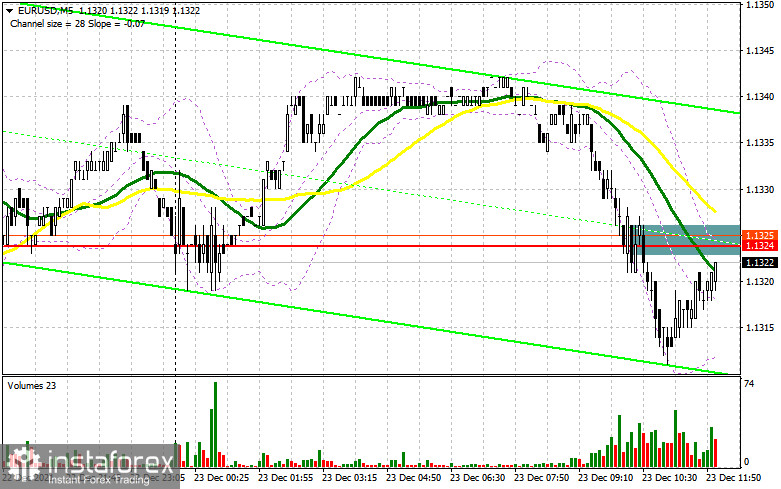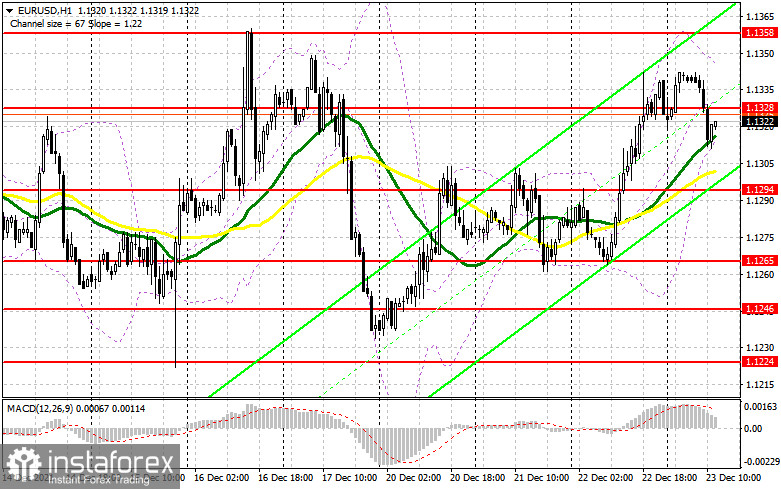To open long positions on EURUSD, you need:
In my morning forecast, I paid attention to the level of 1.1324 and advised making decisions on entering the market. Let's look at the 5-minute chart and figure out what happened. Against the background of the lack of fundamental statistics and new buyers who regret opening long positions at current highs, the euro sank slightly. But there were also no people from the level of 1.1324 who could offer something to resume the bullish movement. As a result, no signals were formed to enter the market, since, after the breakdown of 1.1324, the reverse test of this level did not take place. From a technical point of view, nothing has changed much, however, to level the situation in their favor, the bulls need to bring the new resistance of 1.1328 back under control. And what were the entry points for the pound this morning?

Fairly large output of various fundamental statistics is planned for the American session, which can help the dollar to win back positions against the European currency even more. I recommend paying special attention to the data on changes in the level of spending and income of Americans, as well as the weekly number of initial applications for unemployment benefits in the United States. Weak data on the US economy will allow buyers to break above 1.1328. A reverse test of this level from top to bottom will lead to the formation of a buy signal with the prospect of growth in the area of 1.1358. An equally important task will be to break through and consolidate above this range. Its top-down test forms an additional entry point into euro purchases to rise to the resistance of 1.1381, where I recommend fixing the profits. If the pair declines during the American session and the bulls fail to break above 1.1328, it is best to postpone purchases until the test of the next support - 1.1294, just above which the moving averages playing on the side of the bulls pass. I advise you to open long positions there also only if a false breakdown is formed. You can buy EUR/USD immediately for a rebound from the minimum of 1.1265, or even lower - around 1.1246 with the aim of an upward correction of 20-25 points within a day.
To open short positions on EURUSD, you need:
The main task of the bears for the second half of the day to maintain control over the market will be to protect the resistance of 1.1328, which was formed at the end of today. Only the formation of a false breakdown at this level and strong data on US GDP, especially on the consumer sentiment index from the University of Michigan, will increase pressure on the euro, which will lead to a continuation of the downward movement to the area of 1.1294, where the moving averages are. A breakdown and a bottom-up test of this support will give another signal to open short positions with the prospect of a decline to the area of 1.1265, which will completely negate all the efforts of euro buyers observed yesterday. Going beyond this level will demolish several stop orders and cause a larger drop in EUR/USD with the resumption of the bearish trend in the area of 1.1246 and 1.1224. A more distant target will be the 1.1208 level, where I recommend fixing profits. In the case of the growth of the euro and the absence of bear activity at 1.1328, it is best not to rush with sales. The optimal scenario will be short positions when a false breakdown is formed near the December maximum of 1.1358. It is possible to sell EUR/USD immediately for a rebound only higher, from 1.1381 and 1.1415, with the aim of a downward correction of 15-20 points.

The COT report (Commitment of Traders) for December 14 recorded a decrease in both short and long positions, but the latter turned out to be slightly more, which led to an increase in the negative value of the delta. However, it is worth noting that these data do not take into account the results of the meeting of the Federal Reserve System and the European Central Bank. But if we look at the overall picture, trading in the side channel remains the same, and even the meetings of the central banks did not allow us to decide on the further direction of the pair. Buyers of risky assets are not in a hurry to build up long positions even after the statement of the European Central Bank that it plans to fully complete its emergency bond purchase program in March next year - this indicates a change in the bank's policy towards its tightening. On the other hand, the Federal Reserve is already planning to raise interest rates by this time, which makes the US dollar more attractive. However, the uncertainty with the new strain of coronavirus, Omicron, continues to scare market participants away from active actions: no one wants to buy an overbought dollar, but the cheap euro is also not a very attractive tool yet. The COT report indicated that long non-commercial positions declined from the level of 194,869 to the level of 189,530, while short non-commercial positions fell from the level of 203,168 to the level of 201,409. This suggests that traders are taking a wait-and-see attitude against the backdrop of all the uncertainty with the global economy. At the end of the week, the total non-commercial net position increased its negative value from -8,299 to -11,879. The weekly closing price did not change at all due to the side channel - 1.1283 against 1.1283 a week earlier.
Signals of indicators:
Moving averages
Trading is conducted above 30 and 50 daily moving averages, which indicates an attempt by the bulls to continue the upward correction.
Note. The period and prices of moving averages are considered by the author on the hourly chart H1 and differ from the general definition of the classic daily moving averages on the daily chart D1.
Bollinger Bands
A breakthrough of the lower limit of the indicator in the area of 1.1300 will lead to a larger drop in the euro.
Description of indicators
- Moving average (moving average determines the current trend by smoothing out volatility and noise). Period 50. The graph is marked in yellow.
- Moving average (moving average determines the current trend by smoothing out volatility and noise). Period 30. The graph is marked in green.
- MACD indicator (Moving Average Convergence / Divergence - moving average convergence/divergence) Fast EMA period 12. Slow EMA period 26. SMA period 9
- Bollinger Bands (Bollinger Bands). Period 20
- Non-profit speculative traders, such as individual traders, hedge funds, and large institutions that use the futures market for speculative purposes and meet certain requirements.
- Long non-commercial positions represent the total long open position of non-commercial traders.
- Short non-commercial positions represent the total short open position of non-commercial traders.
- Total non-commercial net position is the difference between the short and long positions of non-commercial traders.
 English
English 
 Русский
Русский Bahasa Indonesia
Bahasa Indonesia Bahasa Malay
Bahasa Malay ไทย
ไทย Español
Español Deutsch
Deutsch Български
Български Français
Français Tiếng Việt
Tiếng Việt 中文
中文 বাংলা
বাংলা हिन्दी
हिन्दी Čeština
Čeština Українська
Українська Română
Română

